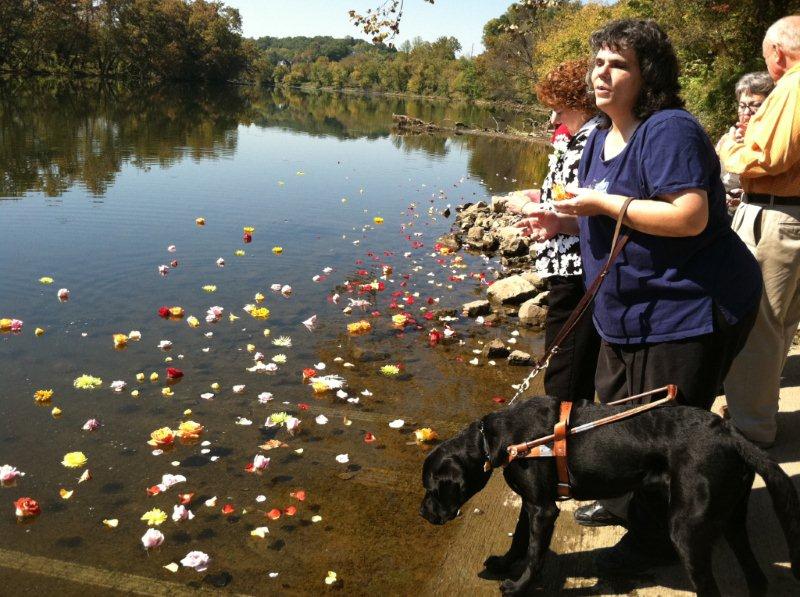Once upon a time, I had a child and called him George. I had all kinds of hopes and dreams for that child. We were going to take him on the kinds of outings kids love, and for his birthdays, we’d invite his friends to come too. We would delight in watching him grow from babyhood to childhood as he ran and jumped and played with his peers; we would laugh at the funny things he said as he was learning to talk; he would make cookies with me and we’d go for picnics at the zoo. When he became a big brother he would take pride in helping with the baby.
One day, when George was almost four, the hopes and dreams crumbled as a doctor gave me the news that George had autism. As I sat there in shock (strange really, since I’d known for a year that something was wrong) I did not yet know that at some point in the future, I would come to accept a new kind of “normal”, that my hopes and dreams would take on a different, but still meaningful form, and that while the journey would take us on the scenic route, we would still see many wonderful things along the way.
It hasn’t all been a cakewalk. There have been hard times. I have had to learn how to restrain my son with my bodyweight to stop him from hurting himself. Speech is still sporadic enough that we celebrate every single word, every single sentence. It saddens us that George does not have friends, preferring to play by himself.
One of the hardest things to deal with has been the reactions of other people. We get rude stares in grocery stores, and complete strangers tell us that what our child needs is “a good hiding”. When people see George having difficulty in a public place, they jump to the immediate conclusion that he is misbehaving. Don’t get me wrong – sometimes he is. He may have autism, but let’s face it – an eight-year-old boy is an eight-year-old boy. Most times, though, George is having trouble with the brightness of the florescent lighting, or the overabundance of sounds, or all of the conversations going on around him that he does not know how to filter.
I sometimes wish for a magical potion, a Perfume of Arabia that I could sprinkle onto people to open their eyes and help them understand.
In the absence of a Perfume of Arabia, the best I can do is write about my experiences and hope that it will make a difference to someone’s life. Like it did to a reader, Tazz, who along with her dog Campbell, had an incredible encounter with a special needs child. With Tazz’s permission, I am sharing the story here. I’m not even going to bother rewording it. Tazz’s words can speak very well for themselves.
“One thing I learned is to never ever judge what I see a child doing, because for all I know there may be a problem I do not know about. Turns out this info came in very handy for me not long ago. There is a family who are members of the church I am currently attending part time. Their son has some kind of a problem that they have not quite diagnosed yet. However, it causes him to sometimes have horrible meltdowns. I was walking down the hall one day during Sunday School time going back to class from the bathroom when from a room down the hall a ways I heard the most heartbreaking crying I ever heard, and knew it was this little boy having another hard time. His mother was doing all she could to calm the child. I followed my heart and took a chance. I softly knocked on the door, and asked if I could help. She had come to the door with the melting down child in her arms, and when he saw Campbell his screaming stopped. I mean like turning off a switch. I asked if I could bring Campbell in and visit for a minute. She agreed and we all sat on the floor with the little boy calming down and petting Campbell. They are now looking in to the possibility of getting a therapy dog for this child. Campbell has come to rescue this child a couple more times since that day. Because now if we are there, and this child starts to have a problem they come and get me from where ever I am and I happily go and help. Well, Campbell helps.”
Is this not the most amazing story? Tazz had an instinct and she followed it. She and her dog were exactly what that little boy and his Mom needed. We special needs parents all need people like this – people who don’t necessarily know the circumstances, but who open their hearts to people who really need it.
To Tazz and all of the people like her, thank you. Thank you for being there. Thank you for being you. You restore my faith in the goodness of human nature.
This week’s Indie Ink Challenge came from Head Ant, who gave me this prompt: What would your proverbial “perfumes of Arabia” take care of? Fiction or non-fiction.
I challenged lisa with the prompt: Write about anything you like, but include the following: cotton candy, a dog, and a broken-down taxi.
Photo credit to Tazz. This picture was taken at an event to remember the victims of domestic violence.











